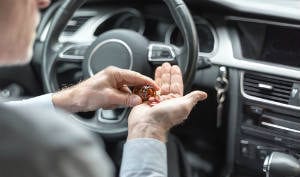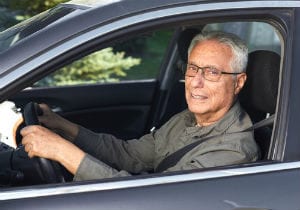
A high number of elderly drivers can be found on the roads in New Jersey and across the country, according to the AAA Foundation for Traffic Safety.
Many wonder whether an increased number of older drivers could potentially become a traffic safety issue – especially in light of the fact that many of these drivers may consume one or more medications.
In fact, during one recent year, more than 25 percent of drugged drivers involved in fatal car accidents in the U.S. were age 50 or older, the National Institute on Drug Abuse (NIDA) reports.
Report: More Elderly People are Driving Today
In the spring of 2014, the AAA Foundation for Traffic Safety issued a report about its survey of elderly drivers. The report found:
- 84 percent of Americans age 65 and older hold a driver’s license.
- 17 percent of drivers on U.S. roads are 65 or older.
Not only are there more elderly drivers, but these drivers are also driving more frequently than ever before. The AAA survey revealed that, between 1990 and 2009:
- Trips among drivers age 65 and older increased by 20 percent
- The miles traveled by these drivers rose by 33 percent.
The survey results indicated that elderly drivers tend to be fairly cautious drivers. However, even the most prudent elderly drivers can still pose a risk to themselves, their passengers and others on the road if they get behind the wheel after taking certain prescription or over-the-counter medications.
As the AAA survey found, 9 in 10 drivers who are age 65 or older use prescription drugs, while nearly two-thirds of these older drivers use five or more medications that could have an effect on their ability to drive safely.
Unfortunately, many seniors may be unaware of the side effects of the medications they take, or they may not realize how their medications interact with other drugs, herbal supplements, food or drinks.
How Do Medications Impact Older Drivers?
 Several types of medications prescribed by doctors or bought over the counter can impair a driver of any age both mentally and physically. The medications may cause drowsiness, blurry vision and a significant delay in a person’s reaction time.
Several types of medications prescribed by doctors or bought over the counter can impair a driver of any age both mentally and physically. The medications may cause drowsiness, blurry vision and a significant delay in a person’s reaction time.
These medications include:
- Pain relief pills
- Antidepressants
- Decongestants
- Antihistamines
- Tranquilizers.
For instance, according to an article in the Dayton Daily News, diphenhydramine is the active ingredient found in many cold and allergy medications. This ingredient can “have the same effect on driving as being above the legal limit for blood alcohol concentration,” according to the article.
The risk of impairment after consuming certain medications may be greater among elderly drivers due to the fact that they may be unable to “break down the drug in their system as quickly as younger people,” NIDA points out.
How Can Seniors Prevent Drugged Driving Accidents?
 If you are an older New Jersey resident who uses one or more medications, you should be cautious when it comes to driving.
If you are an older New Jersey resident who uses one or more medications, you should be cautious when it comes to driving.
AAA suggests that you always read the fine print on your medications. You should especially pay attention to any label warnings about driving or “operating heavy machinery” after taking the drug.
You should also learn about how your medications interact. A medication, alone, may not produce side effects that impact your driving ability. However, when combined with other drugs, it could create a serious safety risk for you.
Finally, you need to talk to your doctor. You should make a list of the medications you take. You should see your doctor and ask questions about how the medications interact and whether they could impact your driving.
You may also want to check out the AAA Foundation for Traffic Safety’s free Roadwise Rx online tool. The program:
- Provides details about side effects associated with many different types of medications.
- Gives personalized feedback for seniors using medications and herbal supplements, and the ways that these products can interact with one another as well as with food products.
- Encourages seniors to discuss their personalized feedback with a doctor or pharmacist and learn about other medication options that could reduce their risk of a car accident.
Roadwise Rx emphasizes the need for families to discuss the issue of drugged driving and to find alternative options for seniors whose medications could lead to an impaired driving accident.
Our New Jersey Car Accident Lawyers Can Help You
Impaired driving accidents are serious. It is important to take steps to prevent them. Please use caution if you are an older driver or if someone you love is an older driver who uses one or more medications.
If you are involved in a collision with an elderly driver, you should seek help immediately from an experienced New Jersey car accident lawyer.
At Davis, Saperstein & Salomon, P.C., for instance, we can conduct a prompt investigation of your case and determine whether medication-related impairment may have contributed to the crash.
Our consultations are always free, and we do not charge for our legal services unless we obtain a financial recovery for you. Call or reach us online today to discuss your case.
- About the Author
- Latest Posts
Since 1981, the compassionate personal injury lawyers at Davis, Saperstein & Salomon have been delivering results for our deserving clients. We are solely committed to helping injured individuals, never representing corporations. No matter how large or small your personal injury case is, you can trust that it is important to us.












